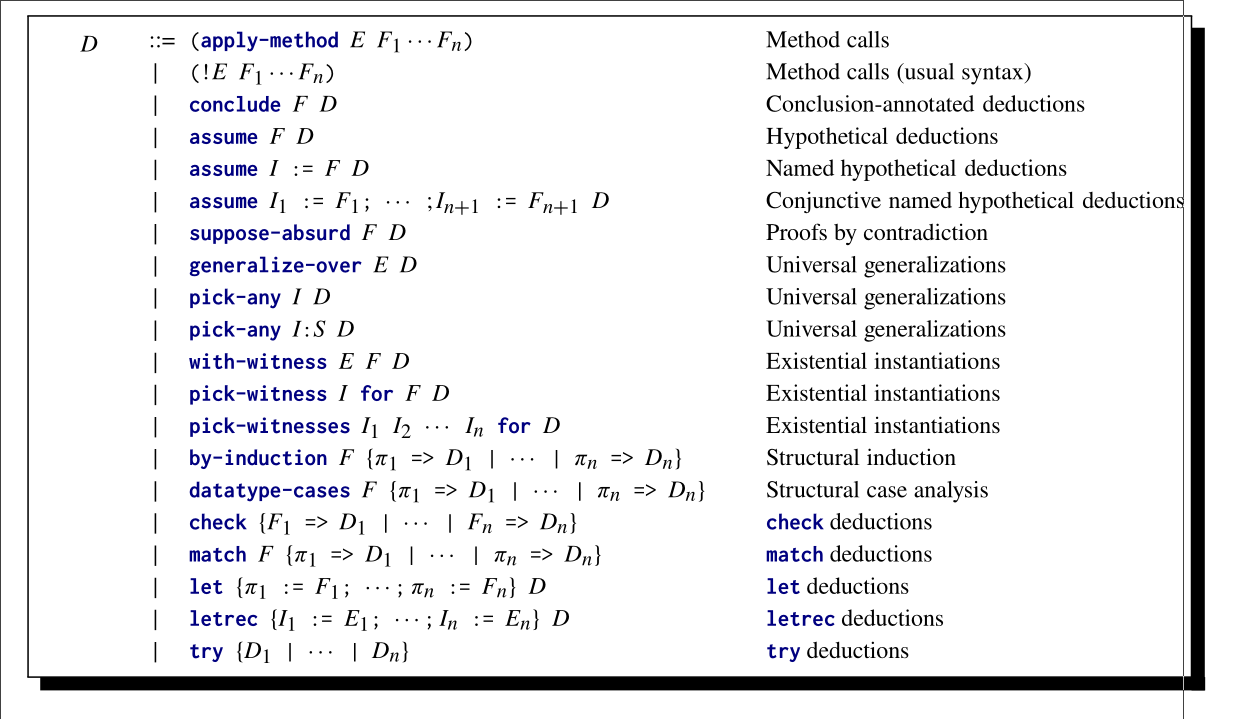Athena-LTL
Leonardo Angel - Mateo Sanabria A

1
LTL overview
2
Syntax and operational semantics of Athena’s core language
3
Athena’s core changes
Linear Temporal Logic (LTL)
#LTL
Commonly, propositional, discrete, linear temporal logic extends the descriptive power of propositional logic in order to be able to describe sequences of distinct worlds, with each world being similar to a classical model.
In the next moment in time, ‘running’ will be true and, at some time after that, ‘terminated ’ will be true.
Linear Temporal Logic: Syntax
#LTL
In LTL, as well as classical propositional operators, we use temporal operators referring to moments in the future:
Linear Temporal Logic: Syntax
#LTL
"It is always the case that, if either ‘have_passport’ or ‘have_ticket’ is false, then, in the next moment in time ‘board _flight’ will also be false"
Linear Temporal Logic: Semantics
#LTL
Models for temporal logics are typically ‘Kripke Structures’ of the form:
- S is the set of moments in time
- R is a temporal accessibility relation
- π : S → P maps each moment/world/state to a set of propositions. Those that are true in that moment/world/state.
Linear Temporal Logic: Semantics
#LTL
Models for temporal logics are typically ‘Kripke Structures’ of the form:
- S is the set of natural numbers
- π : N → P maps each Natural Number (representing a moment in time) to the set of propositions true at that moment.
Linear Temporal Logic: Semantics
#LTL

Linear Temporal Logic: Semantics
#LTL
The semantics of the standard classical operators is as expected
Linear Temporal Logic: Semantics
#LTL
The ‘next’ operator provides a constraint on the next moment in time

Linear Temporal Logic: Semantics
#LTL
The ‘eventually’ operator describes a constraint on the future. We can be sure that φ will be true either now or in the future, we can not be sure exactly when it will become true

Linear Temporal Logic: Semantics
#LTL
The ‘always in the future’ operator, provides the ability to represent invariant properties, that is properties that are true at all moments in time from now on

Linear Temporal Logic: Semantics
#LTL
Notice that the value of a proposition depends on the model and the moment:

Linear Temporal Logic: Semantics
#LTL
Yet there are LTL formulas that are valid for every model at every moment:
Athena Operational semantics
#Athena
Why?!
We want to implement LTL inside the Athena base core: Athena-LTL
Athena: Operational semantics
- An environment ρ is a computable function that maps any given identifier I either to a value V or to a special unbound token.
- An assumption base β is a finite set of sentences.
- A store σ is a computable function that maps any natural number (representing a memory location) to a value (the location’s contents).
- A symbol set γ is a collection of function symbols and their respective signatures, along with a collection of sort constructors and their arities; γ also includes information on whether a given sort constructor is a datatype or structure, and if so, which function symbols are its constructors.
#Athena
Athena: Operational semantics
Athena's operational deductions for expressions is huge!
#Athena

Athena: Operational semantics
#Athena
The value of the method in ρ, β, σ, and γ is a method value that takes a list of n values V1 , . . . , Vn along with an assumption base β´and store σ´as arguments, and produces the result of evaluating the deduction D in
Athena: Operational semantics
The result of evaluating a phrase F with respect to given ρ, β, σ, and γ, is one of three things:
- A pair (V, σ´) consisting of a value V and a store σ,́ where V is the output of the evaluation and σ´reflects any side effects accumulated during the evaluation
- A pair consisting of an error message and a store σ,́ indicating the occurrence of an error during the computation
- Nontermination.
#Athena
Athena's core changes
#Changes
On top of Athena's first order logic implementation, we would aim to add the necessary axioms and properties in order to be able to reason about LTL on Athena.
(!equiv (!Always ~ ?phi) ~(!Eventually ?phi)) Athena's core changes
One interesting definition we might consider useful could be Invariant, a property that does not change over time.
If invariants are restricted to specific time intervals, LTL can be seen as a succesion of invariants over variable time periods.
#Changes

- Propose a full definition for the Athena-LTL operational semantic
- Understand/Update the current Athena implementation to achieve Athena-LTL
Code
By Mateo Sanabria Ardila
Code
- 147



